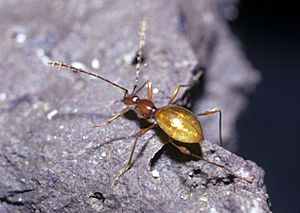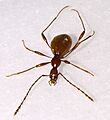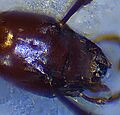Glacicavicola bathyscioides facts for kids
Quick facts for kids Glacicavicola bathyscioides |
|
|---|---|
 |
|
| Conservation status | |
| Scientific classification | |
| Kingdom: | |
| Phylum: | |
| Class: | |
| Order: | |
| Family: |
Leiodidae
|
| Genus: |
Glacicavicola
|
| Species: |
G. bathyscioides
|
| Binomial name | |
| Glacicavicola bathyscioides Westcott, 1968
|
|
The Glacicavicola bathyscioides is a special kind of blind cave beetle. It belongs to the Leiodidae family. This beetle lives only in caves in the western United States. This means it is endemic to that area.
Contents
Meet the Cave Beetle: What it Looks Like
The Glacicavicola bathyscioides is a small, shiny beetle. It looks a bit like an ant. Its body is a brownish-orange color and you can see through it a little. It is about 6 centimeters long and 2 millimeters wide.
This beetle is perfectly suited for living in dark caves. It has long, thin antennae. These antennae are covered in tiny hairs called setae. Its legs are also thin and covered in setae. These features help it move easily over the rough surfaces inside caves.
The Glacicavicola bathyscioides is completely blind. It does not have any eyes. It also lacks the special nerves that usually connect eyes to the brain. Its belly looks bigger than it really is. This is because its hard wing covers, called elytra, are large and dome-shaped. They cover its whole body.
Life Cycle and Habits
Scientists do not know much about the life of the Glacicavicola bathyscioides. This is because it lives in very unique places. It also has a special way of growing.
These beetles have been seen eating parts of other small creatures. They also eat fungus. Scientists think they might eat bacteria too. No one has ever seen a baby beetle, or larva, of this species. Experts believe these beetles live for about three years.
Where This Beetle Lives
The Glacicavicola bathyscioides was first found in 1968. Richard Westcott discovered it in ice caves. These caves are made from old lava tubes in Idaho. They are found along the eastern Snake River Plain.
Since then, this beetle has been found in similar places. This includes a limestone cave in Wyoming. These beetles need very specific conditions to live. They are found in caves that are humid and very cold. They also need ice to be present. If the temperature gets too warm, the beetles die. This is why they can only live in certain areas.
Images for kids
- World Conservation Monitoring Centre 1996. Glacicavicola bathyscioides.






